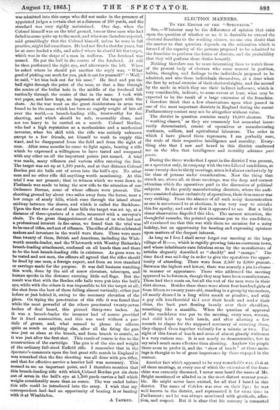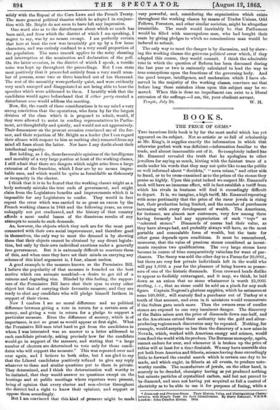ELECTION MANNERS.
To THE EDITOR OF THE "SPECTATOR."
SIR,—Whatever may be the differences of opinion that exist upon the question of whether or no it is desirable to extend the electoral franchise to the working classes, no one can doubt that the answer to that question depends on the estimation which is formed of the capacity of the persons proposed to be admitted to the franchise to perform the duties of electors, and the probability that they will perform those duties honestly.
Nothing therefore can be more interesting than to watch those of the present body of electors who come nearest in position, habits, thoughts, and feelings to the individuals proposed to be admitted, and also those individuals themselves, at a time when the first by actual exercise of their electoral rights, and the second by the mode in which they use their indirect influence, which is very considerable, indicate, to some extent at least, what may be expected to be the result of a large extension of the franchise. I therefore think that a few observations upon what passed in one of the most important districts in England during the recent Parliamentary contest may not be altogether without value.
The district in question contains nearly 18,000 electors. The "working classes," as they are commonly but somewhat incor- rectly denominated, consist of operatives or manufacturing workmen, colliers, and agricultural labourers. The order in which I have placed them represents, I am perfectly sure, the scale of their respective intelligence and morality. Every- thing also that I saw and heard in this district confirmed me in the idea that intelligence and morality advance pani passu.
During the three weeks that I spent in the district I was present, as a spectator only, in company with the two Liberal candidates, at some twenty-five to thirty meetings, attended almost exclusively by the class of persons under consideration. Now the thing that struck me, above all, at these meetings, was the deep and earnest attention which tha operatives paid to the discussion of political subjects. In the purely manufacturing districts, where the audi- ence consisted almost exclusively of operatives, their demeanour was very stalking. From the ahsence of all such noisy demonstration as one is accustomed to at elections, it was very easy to mistake this for apathy, and such at firat it appeared to me. But a little closer observation dispelled this idea. The earnest attention, the thoughtful remarks, the pointed questions pat to the candidates, all convinced me that this was with them no occasion for a noisy holiday, but an opportunity for hearing and expressing opinions upon matters of the deepest interest.
As long as I live I shall never forget our meeting at the huge village of B—, which is rapidly growing into an enormous town, and whose inhabitants earn fabulous sums by the manufacture of articles elegantly described as "shoddy" and " mango." The time fixed was mid-day in order to give the operatives the oppor- tunity of attending. There were from 2,500 to 3,000 present.. Between the highest and lowest, there was scarcely a pin to choose in manner or appearance. Those who addressed the meeting appeared to be foremen, though they may have been manufacturers. These had their casts on, but all the rest of the men were in their shirt sleeves. Besides these there were about four hundre„d girls of from fifteen to twenty years old, standing in a group by themselves, all neatly dressed in a long white smock or pinafore., and with a gay silk handkerchief tiel over their heads and under their chins, the back part floating loosely over their shoulders, something like a mantilla. When the question of approval of the candidates was put to the meeting, every mu, woman, and child held up both hands, and after allowing a few seconds to elapse for the supposed ceremony of emitting them, they clapped them together violently for a minute or two. The sight of this forest of leenis and arms of almost ghastly whiteness is a very curious one. It is not nearly so demonstrative, but to my mind mach more effective than shouting. Anyhow the people there seem to prefer it, and the "show of hands" at these meet- ings is thought to be of great importance by thee., engaged in the contest.
Another fact which appeared to be very remarkable was, tls at at all these meetings, at every one of which the ex:easioa of the fran- chise was earnestly discussed, I never once heard the 119•1123 of Mr. Bright mentioned or alluded to in the most distant manner possi- ble. He might never have existed, for all that I heard in this district. The name of Cobden was ever on their lips ; he was well known in the district, and represented it for some time in Parliament ; and he was always mentioned with gratitade, affec- tion, and respect. But it is clear that his memory is connected solely with the Repeal of the Corn Laws and the French Treaty. The more general political theories which he adopted in conjunc- tion with Mr. Bright do not seem to have left any impression. One word also as to the disturbances about which so much has been said, and from which the district of which I am speaking, I regret to say, was by no means exempt. I am perfectly certain that here at least the row was invariably got up by a few loose characters, and was entirely confined to a very small proportion of the population. The same remark applies to the noisy shouting and interruption at the nomination and declaration of the poll. On the latter occasion, in the district of which I speak, a terrific noise was kept up throughout the proceedings. But I can state most positively that it proceeded entirely from a very small num- ber of persons, some two or three hundred out of ten thousand. The rest of the assembly were perfectly quiet, and were evidently very much annoyed and disappointed at not being able to hear the speeches which were addressed to them. I heartily wish that the candidates would agree beforehand that if either party created a disturbance none would address the meeting.
Now, Sir, the mutt of these considerations is to my mini a very strong conviction that the operatives, who form by far the largest division of the class which it is proposed to admit, would, if they were allowed to assist in sending representatives to Parlia- ment, act thoughtfully and quietly, and would not act aggressively. Their demeanour on the present occasion convinced me of the for- mer, and their rejection of Mr. Bright as a leader (for I can regard their silence with respect to him as nothing else) removed from my mind all fears about the latter. Nor have I any doubt about their intellectual capacity.
Bat holding, as I do, these favourable opinions of the intelligence and morality of a very large portion at least of the working classes, I still admit that there are dangers which might arise from a large extension of the franchise, which I fear are by no means impro- bable ones, and which would be quite as formidable as dishonesty or incapacity in the elector.
I think that it is to be feared that the working classes might as a body seriously mistake the true ends of government, and might claim from the Legislature benefits and improvements which it is impossible for any Legislature to confer. They would in fact repeat the error which was carried to so great an excess by the French working classes in 1848 and the following years, an error unhappily not yet eradicated, and the history of that country affords a most useful lesson of the disastrous results of any attempts to accede to such demands.
As, however, the objects which they seek are for the most part connected with their own social improvement, and therefore good in themselves, the only way to meet the demand is by showing them that their objects cannot be obtained by any direct legisla- tion, but only by their own individual exertions under a generally free government. But it is extremely difficult to convince them of this, and when once they have set their minds on carrying any scheme of this kind argument is, I fear, almost useless.
A good example is the measure known as the Permissive Bill. I believe the popularity of that measure is founded on the best motive which can animate mankind—a desire to get rid of a ruinous and degrading vice. Blinded by this feeling, the suppor- ters of the Permissive Bill have shut their eyes to every other object but that of carrying their favourite measure, and they are ready to elect any candidate who will pledge himself farthest in support of their views.
Now I confess I see no moral difference and no political difference between giving a vote in return for a certain sum of money, and giving a vote in return for a pledge to support a particular measure. Even the difference of secrecy, which is of importance, is not so great as would appear at first sight. What the Permissive Bill men tried hard to get from the candidates in whom I was interested was an answer to a letter addressed to each candidate privately, asking precisely how far the candidate would go in support of the measure, and stating that "a large number of electors are determined to vote only for those candi- dates who will support the measure." This was repeated over and over again, and I believe to both aides, but I am glad to say that the Liberal candidates positively refused to give any reply whatever to these and similar questions put to them in private. They determined, and I think the determination well worthy to be imitated, that they would answer no questions except on the hustings and at public meetings where reporters were present, being of opinion that every elector and non-elector throughout the district had a right to know their opinions, and support or oppose them accordingly.
But I am convinced that this kind of pressure might be made
very powerful, and, considering the organization which exists throughout the working classes by means of Trades Unions, Odd Fellows, Foresters, and other similar societies, might be altogether irresistible. The result would inevitably be that Parliament would be filled with unscrupulous men, who had bought their seats by giving pledges to which no conscientious man would be induced to submit.
The only way to meet the danger is by discussion, and by show- ing the working classes the grievous political error which, if they adopted this course, they would commit. I think the admirable tone in which the question of Reform has been discussed during the last year or two is eminently calculated to lead the way to true conceptions upon the functions of the governing body. And the good temper, intelligence, and moderation which I have ob- served In the majority of the working classes, convince me that before long those mistaken ideas upon this subject may be re- moved. When this is done no impediment can exist to a liberal extension of the suffrage.—I am, Sir, your obedient servant,































 Previous page
Previous page